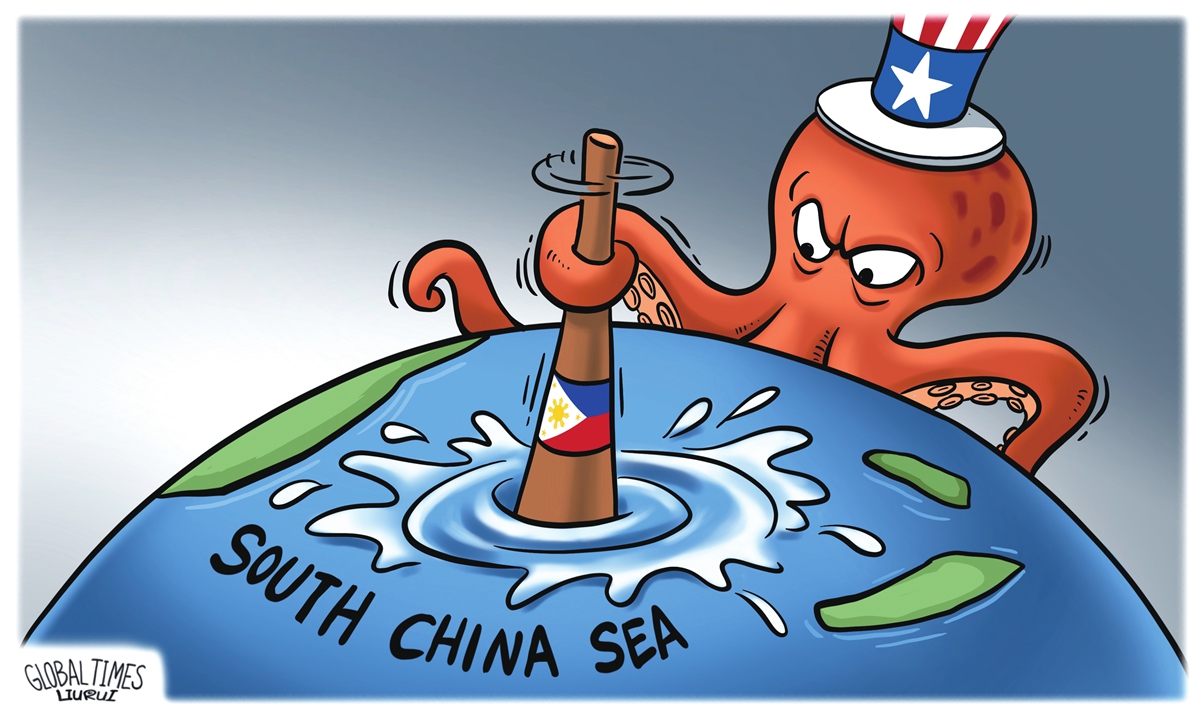
Stirring up trouble. Illustration: Liu Rui/GT
Tensions have escalated again between China and the Philippines over the Ren'ai reef recently, with clear indications of US influence behind the scenes. On Saturday, in disregard of China's repeated warnings, the Philippines sent two vessels that intruded into the adjacent waters of Ren'ai Reef and attempted to deliver construction materials for overhauling and reinforcing a military vessel deliberately and illegally "grounded" at the reef. The China Coast Guard (CCG) vessels stopped them and warned them off through appropriate law enforcement measures.
However, disregarding the fact, the US State Department, in a statement, criticized China's legitimate and lawful actions at sea aimed at safeguarding its rights and enforcing the law, endorsing the Philippines' provocative behavior. Furthermore, US Secretary of Defense Lloyd Austin openly stated on Twitter that the US stands with its allies in "supporting their lawful rights to operate freely in the maritime domain." Noticeably, each time the US declares its support for a country, it signifies that the country is being used as a pawn to achieve US strategic interests. Similarly, by utilizing the South China Sea issue, the US aims to push the Philippines to the forefront of confronting China.
Ren'ai Reef has always been part of China's Nansha Islands. The Philippines has repeatedly promised to tow away the grounded military vessel. However, 24 years have passed and instead of towing it away, the Philippines has sought to repair and reinforce it on a large scale in order to permanently occupy Ren'ai Reef. China's use of water cannons as a warning was a decisive and legitimate forceful response. More importantly, it did not directly threaten the safety of Philippine personnel, being professional, restrained, and beyond reproach.
Austin's statement does not come as a surprise, according to military expert Song Zhongping. He points out that Austin's remarks were intended to emphasize the US-Philippines Mutual Defense Treaty, aligning the Philippines and other countries with territorial disputes against China, thereby establishing US influence and advancing its Indo-Pacific strategy. The US' expansion of the scope of US-Philippines defense cooperation to the South China Sea, including the Ren'ai Reef, brazenly infringes upon China's sovereignty and lacks any credible foundation for asserting "lawful rights to operate freely in the maritime domain."
In reality, before this recent dispute, the South China Sea had experienced a period of relative stability due to joint efforts from China and other stakeholders. However, the US has recently taken a series of actions, seeking to sow confusion and discord in the South China Sea.
Li Kaisheng, deputy director of the Shanghai Institute of International Studies, believes the US is attempting to strategically pressure China by enticing the Philippines and other countries to create trouble in the South China Sea. The US may aim to tie the Philippines, particularly the current Marcos Jr administration, and to steer its foreign policy toward the US. Furthermore, the US is pushing for small-scale multilateral cooperation in the Indo-Pacific region, such as US-Japan-Philippines and US-Japan-Australia-Philippines partnerships, with the South China Sea issue becoming a part of this maneuvering.
Song Zhongping said if the US continues to endorse the Philippines, escalating the territorial dispute between China and the Philippines, the Philippines may become a casualty of great power competition, as the US would not confront China, a major military power, solely for the sake of the Philippines' interests. Furthermore, in the event of a crisis or conflict in the South China Sea involving China and neighboring countries, all nations would be victims, while the US could potentially withdraw just as it has done in the past with conflicts such as the Afghanistan War, Vietnam War, and Korean War.
The US is currently the greatest disruptor in China-Philippines relations. To prevent further escalation and conflicts, it is necessary for China and the Philippines to engage in dialogue and negotiations on sovereignty issues, reaching a consensus on resolving territorial disputes and effectively managing complex situations. Simultaneously, negotiations on the Code of Conduct (COC) between China and ASEAN should be expedited to ensure that actions adhere to clear rules.
Additionally, undue interference from the US, Japan, and other external powers must be resisted. These external forces do not desire peace and stability in the South China Sea. China's resolute defense of national sovereignty and territorial integrity is beyond question, and these external powers should respect China's territorial sovereignty and maritime rights in the South China Sea while acknowledging the efforts of regional countries in maintaining peace and stability.
The author is a reporter with the Global Times. maruiqian@globaltimes.com.cn




